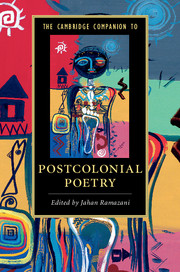25 results
14 - The Poem as World
- from Part III - The Poem in the World
-
-
- Book:
- The Cambridge Companion to the Poem
- Published online:
- 30 May 2024
- Print publication:
- 06 June 2024, pp 230-248
-
- Chapter
- Export citation
31 - Poetry, (Un)Translatability, and World Literature
- from Part VI - Poetics, Genre, Intermediality
-
-
- Book:
- The Cambridge History of World Literature
- Published online:
- 17 August 2021
- Print publication:
- 09 September 2021, pp 587-620
-
- Chapter
- Export citation
Contributors
-
- Book:
- The Cambridge Companion to Postcolonial Poetry
- Published online:
- 24 March 2017
- Print publication:
- 27 February 2017, pp ix-xiii
-
- Chapter
- Export citation
Index
-
- Book:
- The Cambridge Companion to Postcolonial Poetry
- Published online:
- 24 March 2017
- Print publication:
- 27 February 2017, pp 272-276
-
- Chapter
- Export citation
Contents
-
- Book:
- The Cambridge Companion to Postcolonial Poetry
- Published online:
- 24 March 2017
- Print publication:
- 27 February 2017, pp vii-viii
-
- Chapter
- Export citation

The Cambridge Companion to Postcolonial Poetry
-
- Published online:
- 24 March 2017
- Print publication:
- 27 February 2017
Part I - Regions
-
- Book:
- The Cambridge Companion to Postcolonial Poetry
- Published online:
- 24 March 2017
- Print publication:
- 27 February 2017, pp 17-124
-
- Chapter
- Export citation
Dedication
-
- Book:
- The Cambridge Companion to Postcolonial Poetry
- Published online:
- 24 March 2017
- Print publication:
- 27 February 2017, pp v-vi
-
- Chapter
- Export citation
Part II - Styles
-
- Book:
- The Cambridge Companion to Postcolonial Poetry
- Published online:
- 24 March 2017
- Print publication:
- 27 February 2017, pp 125-192
-
- Chapter
- Export citation
Part III - Spaces, Embodiments, Disseminations
-
- Book:
- The Cambridge Companion to Postcolonial Poetry
- Published online:
- 24 March 2017
- Print publication:
- 27 February 2017, pp 193-262
-
- Chapter
- Export citation
Introduction
-
-
- Book:
- The Cambridge Companion to Postcolonial Poetry
- Published online:
- 24 March 2017
- Print publication:
- 27 February 2017, pp 1-16
-
- Chapter
- Export citation
Chronology
-
- Book:
- The Cambridge Companion to Postcolonial Poetry
- Published online:
- 24 March 2017
- Print publication:
- 27 February 2017, pp xv-xxviii
-
- Chapter
- Export citation
Copyright page
-
- Book:
- The Cambridge Companion to Postcolonial Poetry
- Published online:
- 24 March 2017
- Print publication:
- 27 February 2017, pp iv-iv
-
- Chapter
- Export citation
Acknowledgments
-
- Book:
- The Cambridge Companion to Postcolonial Poetry
- Published online:
- 24 March 2017
- Print publication:
- 27 February 2017, pp xiv-xiv
-
- Chapter
- Export citation
Guide to Further Reading
-
- Book:
- The Cambridge Companion to Postcolonial Poetry
- Published online:
- 24 March 2017
- Print publication:
- 27 February 2017, pp 263-271
-
- Chapter
- Export citation
Chapter 22 - Modernist Inflections, Postcolonial Directions
- from Part III
-
-
- Book:
- A History of Modernist Poetry
- Published online:
- 05 May 2015
- Print publication:
- 27 April 2015, pp 459-478
-
- Chapter
- Export citation
29 - Poetry and postcolonialism
-
-
- Book:
- The Cambridge History of Postcolonial Literature
- Published online:
- 28 January 2012
- Print publication:
- 12 January 2012, pp 938-981
-
- Chapter
- Export citation
14 - Black British poetry and the translocal
- from Part IV - Later Modernities
-
-
- Book:
- The Cambridge Companion to Twentieth-Century English Poetry
- Published online:
- 28 January 2008
- Print publication:
- 13 December 2007, pp 200-214
-
- Chapter
- Export citation
12 - Caliban’s modernity: postcolonial poetry of Africa, South Asia and the Caribbean
- from Part II: - Authors and Alliances
-
-
- Book:
- The Cambridge Companion to Modernist Poetry
- Published online:
- 28 November 2007
- Print publication:
- 19 July 2007, pp 207-222
-
- Chapter
- Export citation
Looking Backward, Looking Forward: MLA Members Speak
-
- Journal:
- PMLA / Publications of the Modern Language Association of America / Volume 115 / Issue 7 / December 2000
- Published online by Cambridge University Press:
- 23 October 2020, pp. 1986-2078
- Print publication:
- December 2000
-
- Article
- Export citation



